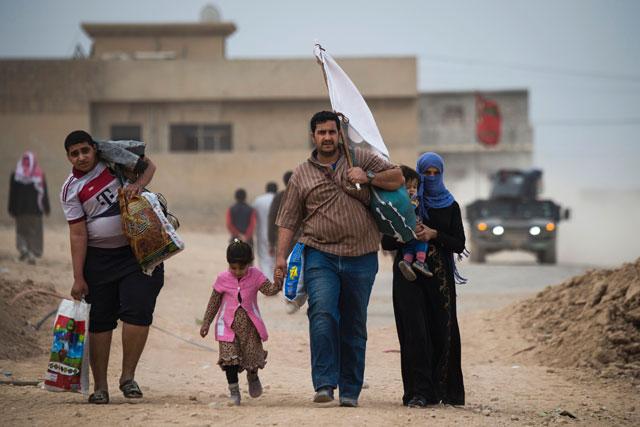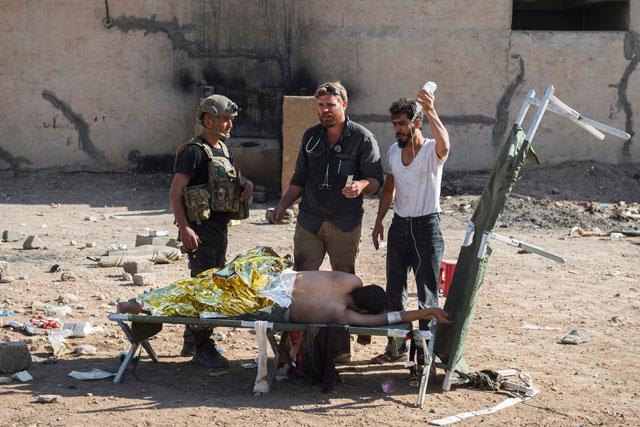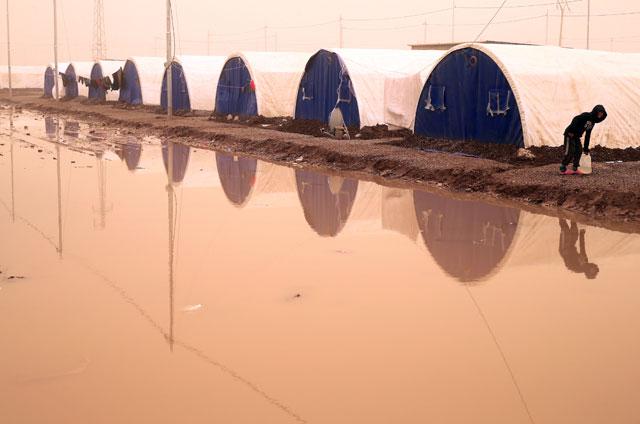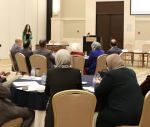You are here
Iraqis demand food from troops in newly cleared Mosul areas
By AP - Nov 16,2016 - Last updated at Nov 16,2016

An Iraqi carries a white flag as families flee to an area held by the Iraqi Special Forces 2nd Division in the Samah neighbourhood of Mosul on Tuesday, during an ongoing operation against Daesh militants (AFP photo)
MOSUL — Hundreds of Iraqi civilians spilled into the streets Tuesday in eastern Mosul areas recently retaken from the Daesh terror group to demand food from the military as rations run low in their neighbourhoods, an Iraqi officer said.
Gunfire rang out in residential districts of Mosul amid heavy fighting, a testimony to the long road ahead as Iraqi forces and their allies battle to wrest control of Iraq's second-largest city from Daesh militants.
About 700 residents gathered in three areas of the city's Zahra and Qadisiya neighbourhoods, the latter of which was the scene of a fierce Daesh counterattack a day earlier, said Maj. Salam Al Obeidi.
The Iraqi troops were sharing what rations they have with the civilians.
"This is a problem for us because the food we have is not enough for them and we're waiting for more food to be sent from the government," Obeidi said. "Now the Iraqi soldier is giving his food to the civilians."
Iraq launched a major offensive last month to drive Daesh out of the northern city, which is still home to more than 1 million civilians.
Special forces have captured a foothold in Mosul's east, and have been advancing slowly over the past week to avoid casualties and civilian deaths as Daesh militants emerge to attack from the dense, urban landscape, often with armour-plated suicide car bombs.
Near the northeastern Zahra district, explosions and gunfire erupted Tuesday as the special forces advanced. Daesh militants fired mortars on the troops from apartment windows in Al Samah neighbourhood, wounding at least seven civilians when the shells landed in the streets below.
In a dust-swept open area, the army set up seven beds to treat wounded troops and civilians in a field clinic. Teaming up with foreign volunteers, Iraqi medics administered first aid before sending the wounded to the hospital.
Among the wounded was 45-year old Ziad Abid Nayef, who was hit by shrapnel from a mortar shell while he was standing in the street, and a seven-year old child.
Hundreds of civilians who managed to get out converged on the streets to exchange news. There was a long line outside a shop selling cigarettes. People argued and bought dozens of packs each.
“Before, it was prohibited, cigarettes are prohibited. Now we are free to smoke, so they are buying lots of cigarettes,” said one resident, Hani Hamed, laughing happily.
US-led coalition warplanes flew overhead at low altitude while columns of smoke rose over the city.
The militants struck back against special forces in Qadisiya a day earlier, Maj. Gen. Sami Al Aridi said. Two dozen men wearing suicide vests charged the front lines, setting off a three-hour battle that killed 20 militants and severely wounded a special forces soldier.
The Iraqi armed forces do not release official casualty figures, but field medics have noted dozens of killed and wounded since the operation to liberate the city began on October 17.
Since last week’s quick advance into Mosul proper, Iraqi forces have struggled to hold territory under heavy Daesh counterattacks.
At a news conference south of Mosul, Interior Ministry Spokesman Brig-Gen. Saad Maan said the military has driven Daesh out from over a third of the eastern half of the city, divided by the Tigris River.
“More than a third of this side has been liberated,” Maan told reporters at the Qayyarah Air Base, a main port of entry for forces headed northward to the battle.
Col. John Dorrian, a spokesman for the US-led forces supporting the operation, said at the same news conference that air strikes had so far destroyed 59 suicide car bombs and over 80 tunnels.
“We will continue to strike the enemy for as long as it takes for the Iraqi flag to be raised over Mosul and every other corner of this country,” he said, adding that the coalition had conducted over 4,000 strikes with air power and artillery since the campaign began.
The United Nations said smoke from oil wells and a chemical plant torched by Daesh near Mosul has forced over 1,500 people to seek medical treatment for respiratory problems.
The group’s humanitarian affairs coordination office said the fires have emitted toxic smoke for 25 to 60 days, affecting 14 towns. It said the mid- and long-term effects on people’s health, the environment, agriculture and livelihoods could be serious.
In late October, Daesh shelled and set fire to Al Mishraq Sulfur Gas Factory south of Mosul, causing the deaths of at least four people from toxic fumes, the UN has said, comparing the attack to the use of chemical weapons.
Nearby oil wells set ablaze by Daesh have been burning uncontrollably since June.
Meanwhile in Baghdad, Iraqi officials said bombings in and around the city killed at least 14 people on Tuesday and wounded more than 50.
The attacks targeted outdoor markets, Shiite pilgrims and anti-Daesh Sunni tribal fighters, police said. Medical officials confirmed the casualty figures. All officials spoke on condition of anonymity as they were not authorised to release information.
No group immediately claimed responsibility for the attacks, but they bore the hallmarks of Daesh, which has taken credit for similar bombings. The extremists repeatedly target Iraq’s Shiite majority and security forces.
Related Articles
MOSUL — Layers of hastily erected barricades built from rubble and twisted metal trace Mosul's eastern frontline where Iraqi forces and Daes
BAGHDAD — No food or fuel has reached Mosul in nearly a week and the onset of rain and cold weather threatens a tough winter for more than a
MOSUL — The Daesh terror group militants shelled areas recaptured by Iraqi forces in western Mosul, hitting civilians fleeing the fighting e

















